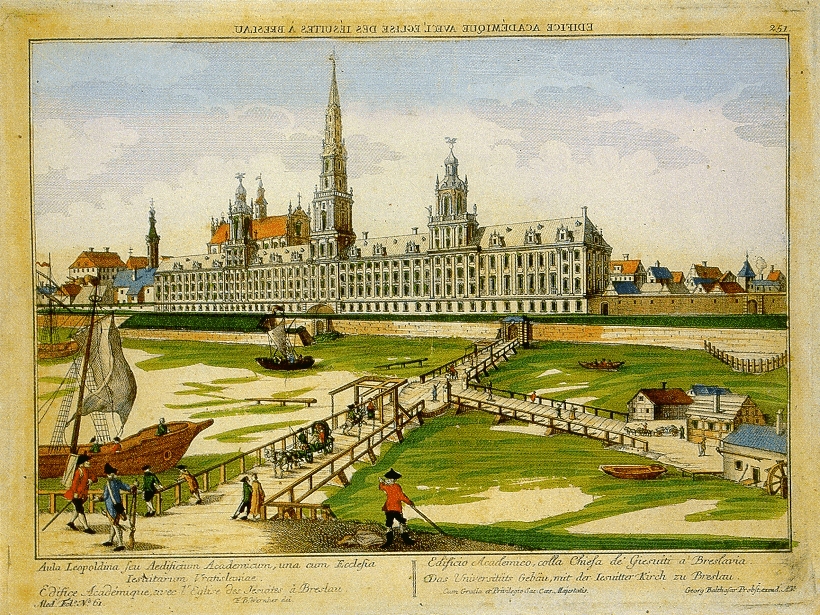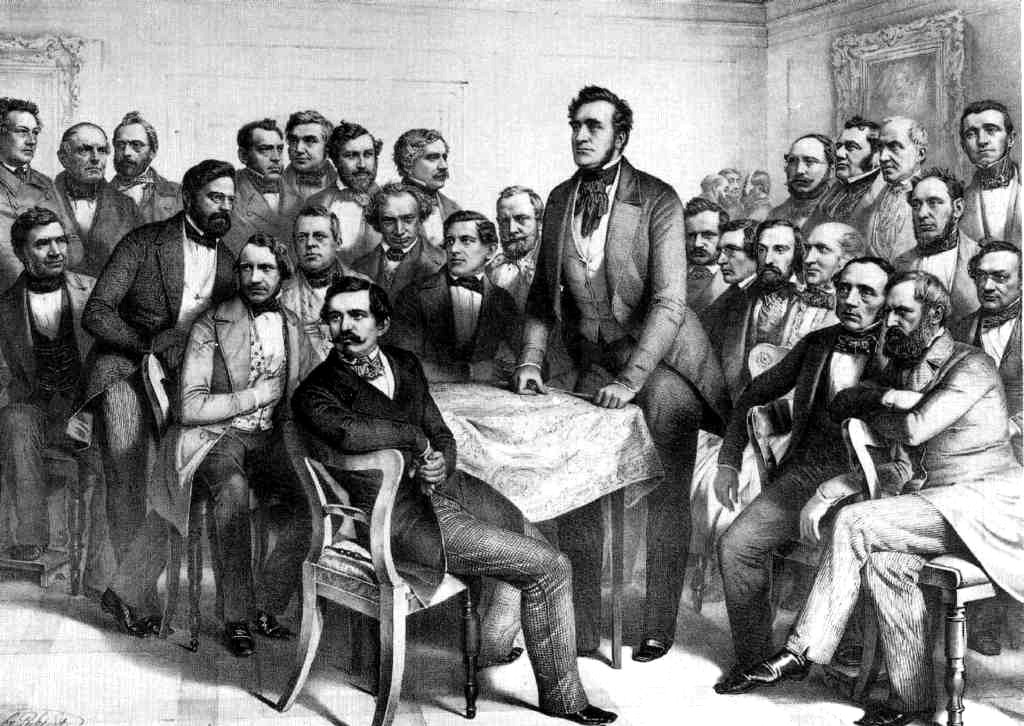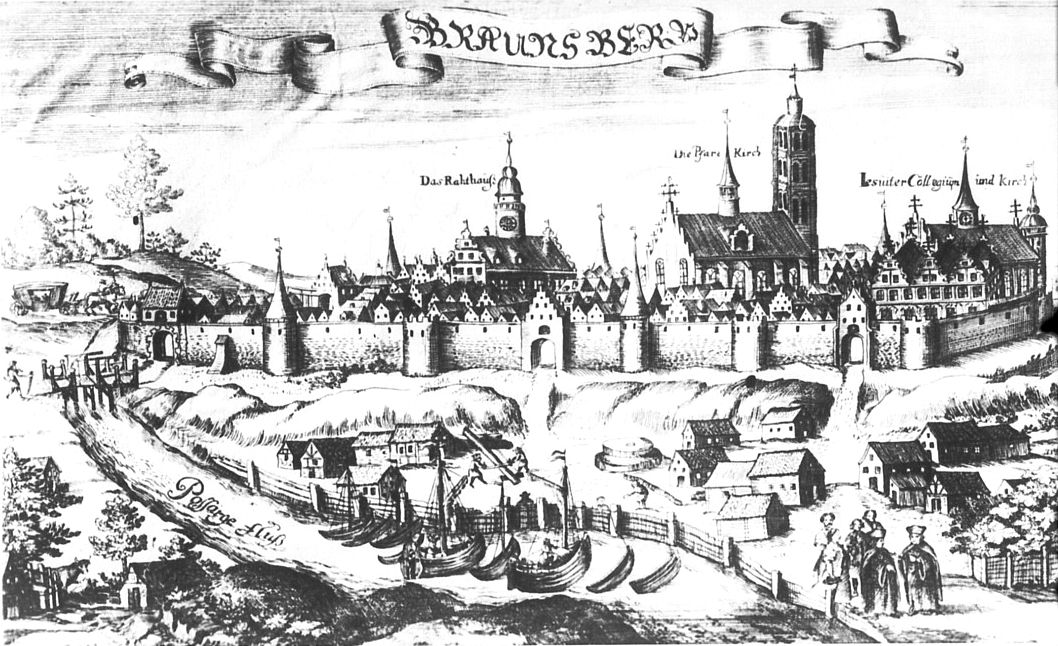|
Carl Adolf Cornelius
Carl Adolf Cornelius (12 March 1819 – 10 February 1903) was a German historian. In the context of the 1848 revolutions he was elected to the Frankfurt Parliament in 1848/49, after which he switched from the schools sector to the universities sector and built a reputation as a church historian. Life Carl Adolf Wenzeslaus Cornelius was born in Würzburg, Northern Bavaria. He was his parents' first child. His father, Carl Joseph Gerhard Cornelius (1793–1843), was an actor. His mother, Friderike (born Friderike Schwadtke: 1789–1867), also came from a family of actors. The (subsequently ennobled) artist Peter von Cornelius (1783- 1867) was an uncle. The composer Peter Cornelius (1924–1874) was a cousin. His own career choice was influenced by Dr. Theodor Brüggemann, a highly successful secondary school teacher who in 1819 had married his aunt, Elisabeth Cornelius. Carl lived with the Brüggemanns from 1831, and received both career guidance and practical sup ... [...More Info...] [...Related Items...] OR: [Wikipedia] [Google] [Baidu] |
Würzburg
Würzburg (; Main-Franconian: ) is a city in the region of Franconia in the north of the German state of Bavaria. Würzburg is the administrative seat of the '' Regierungsbezirk'' Lower Franconia. It spans the banks of the Main River. Würzburg is situated approximately east-southeast of Frankfurt am Main and approximately west-northwest of Nuremberg (). The population (as of 2019) is approximately 130,000 residents. The administration of the ''Landkreis Würzburg'' ( district of Würzburg) is also located in the town. The regional dialect is East Franconian. History Early and medieval history A Bronze Age (Urnfield culture) refuge castle, the Celtic Segodunum,Koch, John T. (2020)CELTO-GERMANIC Later Prehistory and Post-Proto-Indo-European vocabulary in the North and West p. 131 and later a Roman fort, stood on the hill known as the Leistenberg, the site of the present Fortress Marienberg. The former Celtic territory was settled by the Alamanni in the 4th or 5t ... [...More Info...] [...Related Items...] OR: [Wikipedia] [Google] [Baidu] |
Gymnasium (Germany)
''Gymnasium'' (; German plural: ''Gymnasien''), in the German education system, is the most advanced and highest of the three types of German secondary schools, the others being '' Hauptschule'' (lowest) and '' Realschule'' (middle). ''Gymnasium'' strongly emphasizes academic learning, comparable to the British sixth form system or with prep schools in the United States. A student attending ''Gymnasium'' is called a ''Gymnasiast'' (German plural: ''Gymnasiasten''). In 2009/10 there were 3,094 gymnasia in Germany, with students (about 28 percent of all precollegiate students during that period), resulting in an average student number of 800 students per school.Federal Statistical office of Germany, Fachserie 11, Reihe 1: Allgemeinbildende Schulen – Schuljahr 2009/2010, Wiesbaden 2010 Gymnasia are generally public, state-funded schools, but a number of parochial and private gymnasia also exist. In 2009/10, 11.1 percent of gymnasium students attended a private gymnasium. T ... [...More Info...] [...Related Items...] OR: [Wikipedia] [Google] [Baidu] |
Ludwig Maximilian University Of Munich
The Ludwig Maximilian University of Munich (simply University of Munich or LMU; german: link=no, Ludwig-Maximilians-Universität München) is a public research university in Munich, Bavaria, Germany. Originally established as the University of Ingolstadt in 1472 by Duke Ludwig IX of Bavaria-Landshut, it is Germany's sixth-oldest university in continuous operation. In 1800, the university was moved from Ingolstadt to Landshut by King Maximilian I Joseph of Bavaria when the city was threatened by the French, before being transferred to its present-day location in Munich in 1826 by King Ludwig I of Bavaria. In 1802, the university was officially named Ludwig-Maximilians-Universität by King Maximilian I of Bavaria in honor of himself and Ludwig IX. LMU is currently the second-largest university in Germany in terms of student population; in the 2018/19 winter semester, the university had a total of 51,606 matriculated students. Of these, 9,424 were freshmen, while international ... [...More Info...] [...Related Items...] OR: [Wikipedia] [Google] [Baidu] |
University Of Wrocław
, ''Schlesische Friedrich-Wilhelms-Universität zu Breslau'' (before 1945) , free_label = Specialty programs , free = , colors = Blue , website uni.wroc.pl The University of Wrocław ( pl, Uniwersytet Wrocławski, UWr; la, Universitas Wratislaviensis) is a public research university in Wrocław, Poland. It is the largest institution of higher learning in Lower Silesian Voivodeship, with over 100,000 graduates since 1945, including some 1,900 researchers, among whom many have received the highest awards for their contributions to the development of scientific scholarship. Renowned for its high quality of teaching, it was placed 44th by ''QS World University Rankings'': EECA 2016, and is situated on the same campus as the former University of Breslau, which produced 9 Nobel Prize winners. The university was founded in 1945, replacing the previous German University of Breslau. Following the territorial changes of Poland's borders, academics primarily ... [...More Info...] [...Related Items...] OR: [Wikipedia] [Google] [Baidu] |
Habilitation
Habilitation is the highest university degree, or the procedure by which it is achieved, in many European countries. The candidate fulfills a university's set criteria of excellence in research, teaching and further education, usually including a dissertation. The degree, abbreviated "Dr. habil." (Doctor habilitatus) or "PD" (for "Privatdozent"), is a qualification for professorship in those countries. The conferral is usually accompanied by a lecture to a colloquium as well as a public inaugural lecture. History and etymology The term ''habilitation'' is derived from the Medieval Latin , meaning "to make suitable, to fit", from Classical Latin "fit, proper, skillful". The degree developed in Germany in the seventeenth century (). Initially, habilitation was synonymous with "doctoral qualification". The term became synonymous with "post-doctoral qualification" in Germany in the 19th century "when holding a doctorate seemed no longer sufficient to guarantee a proficient transfe ... [...More Info...] [...Related Items...] OR: [Wikipedia] [Google] [Baidu] |
Protestant Reformation
The Reformation (alternatively named the Protestant Reformation or the European Reformation) was a major movement within Western Christianity in 16th-century Europe that posed a religious and political challenge to the Catholic Church and in particular to papal authority, arising from what were perceived to be Criticism of the Catholic Church, errors, abuses, and discrepancies by the Catholic Church. The Reformation was the start of Protestantism and the split of the Western Church into Protestantism and what is now the Roman Catholic Church. It is also considered to be one of the events that signified the end of the Middle Ages and the beginning of the early modern period in Europe.Davies ''Europe'' pp. 291–293 Prior to Martin Luther, there were many Proto-Protestantism, earlier reform movements. Although the Reformation is usually considered to have started with the publication of the ''Ninety-five Theses'' by Martin Luther in 1517, he was not excommunicated by Pope Leo X ... [...More Info...] [...Related Items...] OR: [Wikipedia] [Google] [Baidu] |
Casino Faction
The Casino faction (in German ''Casino-Fraktion'' or simply ''Casino'') was a moderate liberal faction within the Frankfurt Parliament formed on June 25, 1848. Like most of the factions in the parliament, its name was a reference to the usual meeting place of its members in Frankfurt am Main. Casino was the largest and most influential faction at Paulskirche. Its members were for the most part national liberals. Casino was a faction of moderate left-wingers or liberals,Martin Kitchen''A History of Modern Germany: 1800 to the Present'' 2nd ed. Chichester, West Sussex/Malden, Massachusetts: Wiley-Blackwell, 2012, . or right-centrists. Its members were overwhelmingly drawn from the intelligentsia of Prussia and the rest of Northern Germany, and the group's political positions were closer to those of the right wing in the Prussian assembly than to the center-right there, whose positions corresponded to those of center-left factions at Frankfurt. With approximately 130 members, i ... [...More Info...] [...Related Items...] OR: [Wikipedia] [Google] [Baidu] |
East Prussia
East Prussia ; german: Ostpreißen, label= Low Prussian; pl, Prusy Wschodnie; lt, Rytų Prūsija was a province of the Kingdom of Prussia from 1773 to 1829 and again from 1878 (with the Kingdom itself being part of the German Empire from 1871); following World War I it formed part of the Weimar Republic's Free State of Prussia, until 1945. Its capital city was Königsberg (present-day Kaliningrad). East Prussia was the main part of the region of Prussia along the southeastern Baltic Coast. The bulk of the ancestral lands of the Baltic Old Prussians were enclosed within East Prussia. During the 13th century, the native Prussians were conquered by the crusading Teutonic Knights. After the conquest the indigenous Balts were gradually converted to Christianity. Because of Germanization and colonisation over the following centuries, Germans became the dominant ethnic group, while Masurians and Lithuanians formed minorities. From the 13th century, East Prussia was pa ... [...More Info...] [...Related Items...] OR: [Wikipedia] [Google] [Baidu] |
Braniewo
Braniewo () (german: Braunsberg in Ostpreußen, la, Brunsberga, Old Prussian: ''Brus'', lt, Prūsa), is a town in northern Poland, in Warmia, in the Warmian-Masurian Voivodeship, with a population of 16,907 as of June 2021. It is the capital of Braniewo County. Braniewo is the second biggest city of Warmia after Olsztyn and one of the historical centers of the region. Location Braniewo lies on the Pasłęka River about 5 km from the Vistula Lagoon, about 35 km northeast of Elbląg and southwest of Kaliningrad ( pl, Królewiec). The Polish border with Russia's Kaliningrad Oblast lies 6 km north, and may be reached from Braniewo via National road 54. History Middle Ages According to the German geographer Johann Friedrich Goldbeck (1748-1812), the town originally was named Brunsberg after Bruno von Schauenburg (1205–1281), bishop of Olomouc in Moravia, who accompanied King Ottokar II of Bohemia in 1254 and 1267 when the latter participated in the c ... [...More Info...] [...Related Items...] OR: [Wikipedia] [Google] [Baidu] |
Collegium (school)
A collegium is a French form of schooling that is both a secondary school and a college. Information They are uncommon today. Most collegiums in the United States were built by Roman Catholic religious institute A religious institute is a type of institute of consecrated life in the Catholic Church whose members take religious vows and lead a life in community with fellow members. Religious institutes are one of the two types of institutes of consecrate ...s. One example is the College of the Immaculate Conception in New Orleans, established by the Society of Jesus (Jesuits) in 1847. References School types {{Edu-stub ... [...More Info...] [...Related Items...] OR: [Wikipedia] [Google] [Baidu] |
Jesuit
The Society of Jesus ( la, Societas Iesu; abbreviation: SJ), also known as the Jesuits (; la, Iesuitæ), is a religious order (Catholic), religious order of clerics regular of pontifical right for men in the Catholic Church headquartered in Rome. It was founded in 1540 by Ignatius of Loyola and six companions, with the approval of Pope Paul III. The society is engaged in evangelization and apostolic ministry in 112 nations. Jesuits work in education, research, and cultural pursuits. Jesuits also give retreats, minister in hospitals and parishes, sponsor direct social and humanitarian ministries, and promote Ecumenism, ecumenical dialogue. The Society of Jesus is consecrated under the patron saint, patronage of Madonna della Strada, a title of the Blessed Virgin Mary, and it is led by a Superior General of the Society of Jesus, Superior General. The headquarters of the society, its Curia, General Curia, is in Rome. The historic curia of Ignatius is now part of the attached to t ... [...More Info...] [...Related Items...] OR: [Wikipedia] [Google] [Baidu] |



.jpg)


